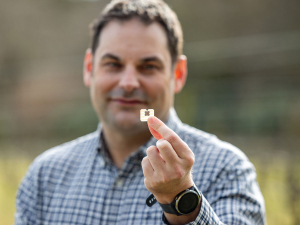A Kiwi-designed biodegradable vine clip is hitting the export market, fuelled by demand for more sustainable vineyard practices.
PolyNatural vine clips were created through a research partnership between Crown Research Institute Scion and Christchurch company EPL, to replace the traditional plastic clips that hold nets over ripening grapes to keep birds and other pests away. About 30 million plastic clips are used by New Zealand’s wine industry every year, and when nets are removed, they add to a growing pile of non-degrading plastic.
With the industry seeking more sustainable solutions, Scion began developing a faster-degrading vine clip made of grape marc and bioplastic. Researchers Dawn Smith and Stephanie Weal led a project trialling different prototypes in the field, testing numerous formulations before arriving at the right mechanical and physical properties. The resulting vine clips are 100% biobased, using waste generated from processing wood, which is fermented using micro-organisms and shaped to create a durable clip that can fully degrade in the right soil conditions.
In 2020 EPL and Scion were recognised at the Sustainable Business Awards by winning the award for Outstanding Collaboration for the work on the predecessor to the PolyNatural vine clip. Lessons learned during the commercialisation process and further market research has sparked additional biodegradable products for the horticulture, viticulture and marine industries.
A number of New Zealand winemakers have successfully trialled the clips, including Cloudy Bay Vineyards in Central Otago and Marlborough. Central Otago Vineyard Manager Derek Beirnes describes them as the perfect product. “Each clip does what it needs to do, whilst being environmentally friendly.”
As well as targeting the Adelaide wine growing region, PolyNatural is planning to export its vine clips to Canada and France, with support from New Zealand Trade & Enterprise. PolyNatural General Manager for Sales and Marketing, Gareth Innes, says the commercialisation process has been a journey of discovery. “Good things take time and we’ve spent several years collaborating with Scion by testing formulations, using different materials and doing a lot of field research to develop a product that we’re confident winegrowers are very satisfied with.”
Gareth says winegrowers around the world are hungry for sustainable products. “Everyone knows that they can’t recycle their way out of the environmental plastic problem. We’re very proud of the mahi tahi (collaboration) that has gone into these products, which are providing solutions for New Zealand, in New Zealand, with benefits to the world. These products are the future for the industry.”












